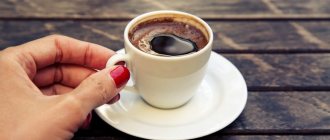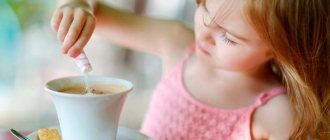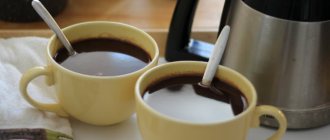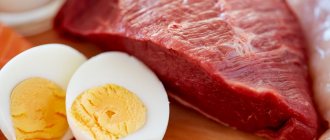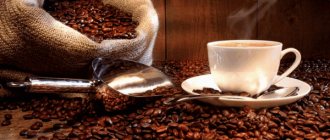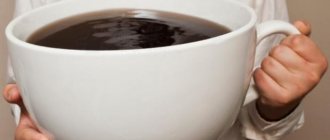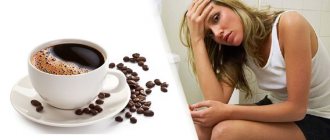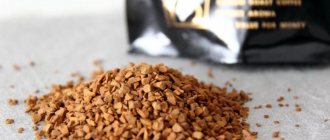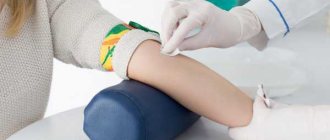The benefits and harms of caffeine
Scientists have conducted many studies regarding the effects of caffeine on the human body. Many questions still remain without clear answers, which causes endless debate. But it is already known exactly how coffee can affect a person.
The beneficial properties of the drink are the main argument of those who are accustomed to drinking it on a regular basis. There are not many of them, but they are very significant. The benefits are as follows:
- Increased sensitivity to insulin;
- Prevention of diabetes, Alzheimer's and Parkinson's diseases;
- Reducing the risk of developing bladder or uterine cancer.
Unfortunately, the drink can also cause harm. It is easy to avoid if you control your consumption and monitor your health. How it can be harmful:
- Addictive;
- Increased blood pressure;
- Dehydration caused by the diuretic effect.
If you don’t drink more than two medium cups of coffee in one day, then you don’t have to worry about negative consequences, but when the addiction mechanism kicks in, a person begins to uncontrollably drink the drink in large quantities, which becomes more dangerous.
If you suddenly quit caffeine, a person may experience withdrawal symptoms. It is accompanied by dizziness, tension cephalalgia, nausea, muscle pain, depressed mood and low concentration. Therefore, you should not suddenly stop drinking it.
According to legends, a shepherd noticed the cheerfulness of his sheep after they had eaten coffee beans, which he immediately told the monk about. He then created a wonderful drink to maintain a state of wakefulness while reading night prayers.
Caffeine for cephalgia
There is no clear answer to the question of whether you can drink coffee when you have a severe headache. It all depends on the root cause of cephalalgia. It can occur due to injury, problems with blood vessels, severe stress, changes in blood pressure, sleep disorders, weight loss, colds, osteochondrosis, hangover.
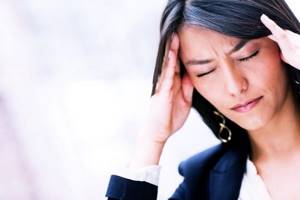
In some cases, a coffee drink will even have a positive effect, easing pain. However, this does not always happen. It is important to take into account that drink lovers who are accustomed to drinking it constantly will not feel any effect against cephalalgia.
You can drink coffee for almost any cephalalgia. The only exceptions are the following cases:
- Hypertension. If a person suffers from high blood pressure, pain can occur at the slightest manifestation of the disease. In such cases, cephalalgia affects the forehead, occipital region, as well as one temple or both at once. Caffeine won't help with a headache like this. If you drink a coffee drink, the symptoms will sharply intensify, and a surge in blood pressure may lead to the need for hospitalization. Hypertensive patients are not recommended to drink coffee even if they feel well.
- Taking painkillers. Some people believe that taking a pain pill with coffee can quickly relieve discomfort. This opinion is wrong, because the combination of painkillers with caffeine has an extremely negative effect on the gastric mucosa. If you take such a folk medicine at least once, there is a risk of developing gastritis or ulcers.
You can drink a cup of coffee for a headache even during pregnancy. In the early stages, there will be no harm from such an action. However, in the 2nd and 3rd trimester, this drink should be treated with caution.
Caffeine is found in chocolate, strong tea, cocoa and Coca-Cola. Its concentration is quite low, but may have an effect on sensitive organisms.
Is it okay to drink coffee when you have a headache?
When a headache occurs, there are not always medications at hand that will quickly get rid of it. A person often begins to look for ways to quickly restore performance using what is at hand. It is a fairly common belief that coffee will definitely help with headaches, which is what people use without taking into account the causes of the disease.
Before you go to brew a drink, you should try other ways to relieve pain:
- Go out into the fresh air or ventilate the room;
- Take a deep breath and exhale, repeating several times;
- Close your eyes and take your mind off everything.
If you have a choice between drinking coffee and tea for a headache, you should choose the latter drink. The reason for this choice is the fact that tea, like coffee, contains substances that stimulate the nervous system, but its effect on the body is milder and more gradual. After drinking a cup of tea, blood circulation improves, more oxygen reaches the brain, due to which vascular spasm goes away and the headache subsides. Green tea has advantages over black tea, since the positive effect after drinking it is achieved faster.
Pain relief
Many people experience a much more serious pain called migraine. It is very sharp and concentrates, as a rule, on one side. During the manifestation of the disease, vasospasm occurs, which causes pain. It is very difficult to fight them, and each new attack becomes a real challenge. This is why many people are concerned about whether it is possible to drink coffee during a migraine.
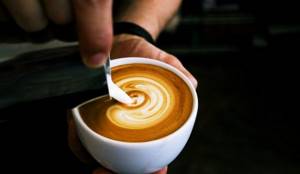
The drink can ease the course of an attack, and it will not cause any harm. It will not be possible to completely get rid of migraines with its help, because... Once it appears, it is practically impossible to influence it in any way. However, an attack can be avoided if you drink coffee when you feel the aura that precedes the onset of pain.
Hypotension is also often the cause of pain. This name hides the low blood pressure that many people experience. It is accompanied by cephalalgia, dizziness, nausea, lack of coordination, weakness, and decreased attention.
If a hypotensive person drinks a cup of coffee, the manifestation of the disease will begin to subside. This is due to the fact that caffeine dilates blood vessels, helping to normalize blood pressure and eliminate all symptoms.
A study conducted by Chicago scientists showed that drinking a cup of coffee for cephalalgia can relieve pain in 60% of cases.
The main causes of pain
Drinking a drink made from coffee beans, even in small quantities, can cause discomfort and malaise. Experts explain this fact by the characteristics of the body. The main reasons why you feel dizzy and have a headache after drinking coffee are:
- High blood pressure . One cup of a strong invigorating drink in case of hypertension causes vasospasm, disrupts blood circulation in the brain, and leads to headaches and dizziness.
- Severe fatigue . When a person needs to overcome drowsiness due to the fact that, for example, he went to bed late in the evening and woke up early in the morning, coffee is the ideal solution to the problem. You can work until the end of the day, and go to bed early in the evening to get a good rest. But when there is a constant lack of sleep, and caffeine is consumed in large doses, this does not bode well. When overtired from the next “invigorating” portion, the body first revives, and then, due to the depletion of energy reserves, fatigue and weakness take their toll and the person tends to fall asleep. At the same time, the headache can be quite intense.
Other reasons
There are reasons that incapacitate a person due to:
- Drinking coffee with added sugar . Sometimes, after just one cup of sweet coffee, your head starts to hurt. This is due to an increase in blood glucose, which enters the body's cells with the help of insulin. At the same time, the pancreas tries to synthesize the hormone as quickly as possible, all organs work hard, which causes unpleasant sensations in the head.
- Coffee overdose . Problems with the cardiovascular system, disorientation in space, nervous overexcitation, insomnia, depression - this is an incomplete list of the results of a caffeine overdose. This amazing and tasty drink, if consumed uncontrolled, can cause nausea, vomiting, delusional ideas, convulsions, hand tremors, and redness of the skin. There is nothing fatal in several cups of coffee drunk per day, but an excess of caffeine has a negative impact on a person’s well-being and health. Adults are not recommended to drink more than two cups of the drink per day. Children under 16 years of age are strictly prohibited from drinking coffee.
- Weakened body . During a cold, it is difficult for the body to work normally and it needs to drink plenty of fluids. Coffee contributes to dehydration, causing severe headaches and fever.
Some people, on the contrary, complain that without coffee they have a headache. The fact is that coffee is addictive, and refusing it provokes withdrawal symptoms. Lethargy, drowsiness, a feeling of dissatisfaction, and frequent headaches appear. Therefore, experts strongly recommend that coffee lovers do not stop drinking coffee suddenly. It is necessary to gradually minimize the strength and number of servings of the drink.
Application
You need to use coffee correctly during attacks of pain. You should not make it very strong or drink too large volumes, and you should not combine it with any medications unless this is permitted in the instructions for the tablets.
When possible, it is recommended to drink one cup of strong tea instead of coffee. It is less harmful, but its caffeine will have a similar effect for a migraine or other illness. This is especially true for green tea. You should also try to relax and distract yourself from everything extraneous, and only then drink your favorite drink.
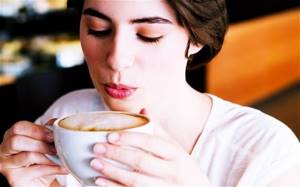
If you still want to drink coffee, then it is best to take it not in its pure form. It would be most correct to use one of three combinations:
- With milk - just add a little fresh milk to a cup of ready-made coffee.
- With lemon - you need to throw one slice of lemon into a cup with the prepared drink.
- With cognac – you should add a very small amount of cognac to the coffee.
The latter option is especially effective for hypotension, because perfectly stimulates increased blood pressure and dilation of blood vessels.
Caffeine can be obtained from painkillers. They will have a greater effect, and you won’t have to waste time brewing the drink. The most popular means are:
- "Midol";
- "Paracetamol";
- Excedrin.
They should be taken without drinking coffee. Take the tablets only with clean water to get the maximum effect without causing harm to your health.
If coffee doesn't help with your pain, then you shouldn't drink an extra cup. Often such actions lead to the opposite effect.
What to do?
You should not tolerate the syndrome, waiting for it to go away on its own. Inaction is sometimes unacceptable, so there are several effective ways to eliminate headaches.
General Tips
Doctors offer some simple and practical advice :
- You can drink a glass or two of regular clean water. Instead, you can take a mug of mint tea. Such drinks promote effective cleaning of blood vessels, which means they quickly bring the body back to normal, eliminating, among other things, headaches.
- If possible, you should lie down to sleep for a couple of hours. During sleep, the effects of caffeine will end and the headache will disappear.
- Staying in the fresh air will have positive results. During a walk, oxygen neutralizes the negative effect of the drink, which normalizes high blood pressure, relieving the characteristic throbbing pain.
Use of medications
If the pain does not go away or severely interferes with any process at the workplace, you should take a painkiller tablet.
It should be noted that the medication taken should not contain caffeine.
The simplest and most accessible medications are the following medications:
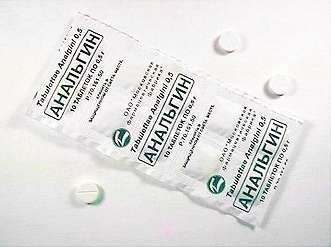
«Analgin«.
Active ingredient: metamizole sodium. Widely used for headaches, chills, and sore teeth. Contraindicated in case of problems with kidney function, as well as blood pathologies.
The average cost is between 19-24 rubles for a standard of 10 tablets.
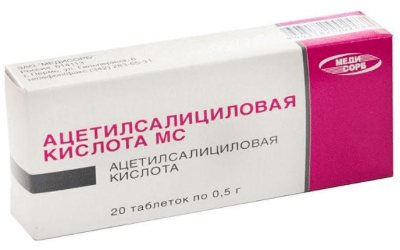
«Acetylsalicylic acid«.
The drug belongs to the group of NSAIDs, which effectively reduces temperature and eliminates pain. The drug is contraindicated for rhinitis, urticaria, pregnancy, ulcers and developed gastritis.
The average price for one package (20 tablets) of the drug is 23-28 rubles.
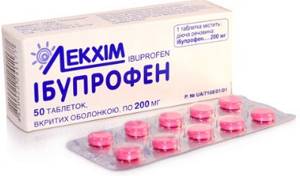
"Ibuprofen"
Belongs to the non-steroidal group of analgesics. Can help with headaches and chills. Contraindicated in ulcerative colitis, scotoma, amblyopia, individual intolerance to the active substance, renal failure.
Article on the topic: What diseases can pain in the temples signal?
Sold at an average cost of 31-38 rubles per standard (50 tablets).
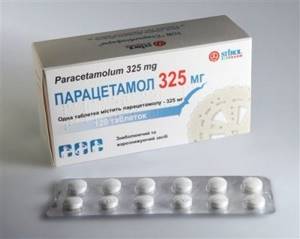
«Paracetamol«.
Effectively relieves pain and is an antipyretic. It has contraindications for renal and liver failure. Affordable.
The average price for 20 tablets per package is 30-34 rubles.
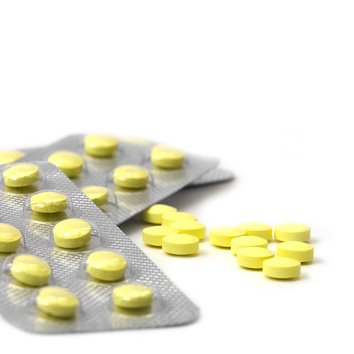
«No-Shpa«.
The active ingredient is drotaverine. The medication is successfully used for headaches and other spasms. Prohibited for patients suffering from renal or heart failure, who have an individual intolerance to drotaverine.
You can buy “No-Shpa” at an average cost of 175 rubles for a standard of 20 tablets.

